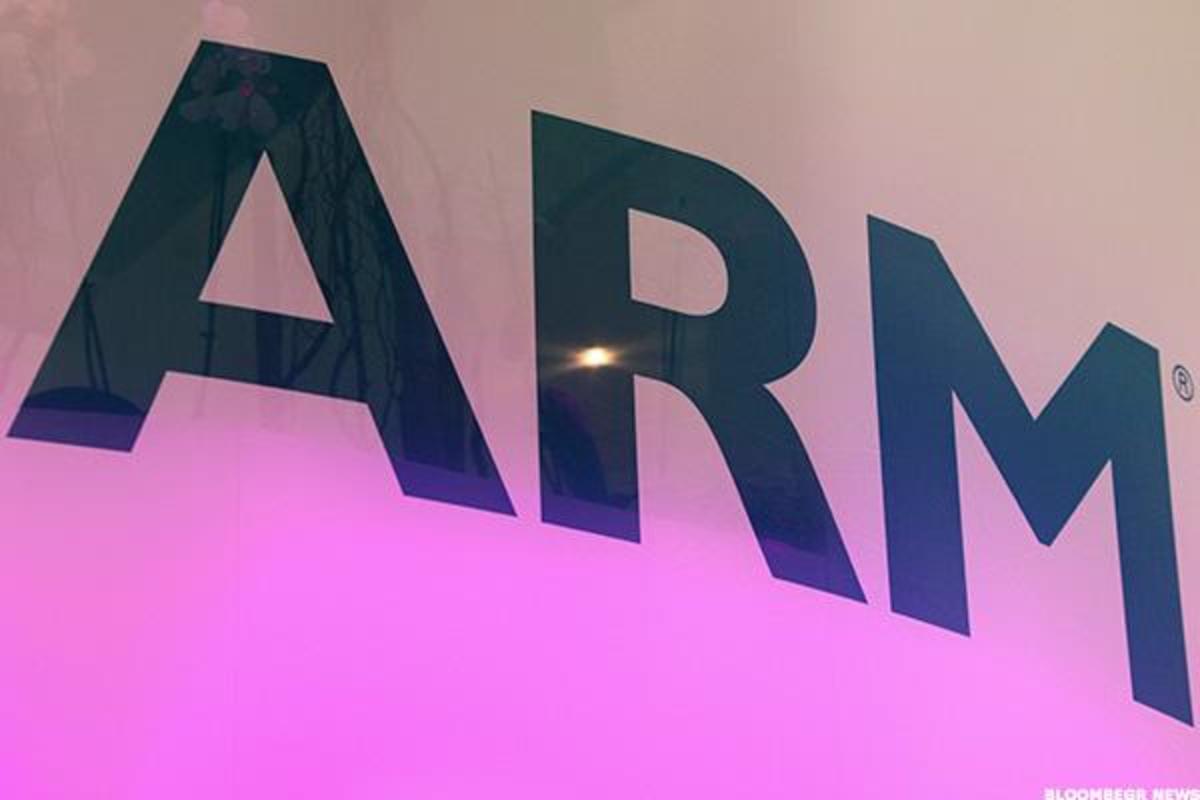
In the immortal words of Yogi Berra, "the future ain't what it used to be."
Of course, the baseball legend and renowned orator made this incisive comment long before the arrival of artificial intelligence, which has pretty much upended everyone's view of what tomorrow will bring.
Related: Microsoft stock tumbles after key segment disappoints
Whatever that future is, Arm Holdings (ARM) wants very much to be part of it.
The U.K. company licenses its chip architecture to companies that make central processing units, or CPUs, the main manager of a computer's actions. The company also collects royalties on every chip shipped with its technology.
Arm, founded in 1990, is majority-owned by the Japanese conglomerate SoftBank Group. (SFTBY)
"The future is very bright and will be built on Arm going forward," Chief Executive Rene Haas told analysts during the company's earnings call. "We are extremely pleased over the last four quarters."
Haas said that every chip being designed today requires a CPU, and "these are being designed with Arm in mind, with our strong tie into all-the-world software."
"We had our fourth straight quarter of record results, 39% year-on-year revenue, which exceeded the high end of the guidance," Haas said. "That was record license revenue, up 70% year-on-year as companies continue to invest in Arm for AI everywhere."

Investor concern about Arm's guidance
Haas told analysts that when people think about the AI data center "and particularly around the accelerator and the CPU that ties into it, clearly the lion's share of the market today with accelerators belongs to Nvidia (NVDA) ."
"And Nvidia, their numbers speak for themselves," he said. "But relative to the penetration of Arm in the data center, they had announced Grace Hopper about a year and a half ago, which was the Arm-based design, which integrates an Arm-based CPU to a Hopper [graphics-processing unit]."
Related: Apple earnings top forecasts, iPhone sales slip ahead of AI launch
Haas said Grace Blackwell, Nvidia’s next advanced platform, will be shipping soon.
"We expect, with that design, to have the volumes be higher than it was on Grace Hopper," he said. "We think that Grace Blackwell, just given the performance and power, will be a very, very good ship for us in the AI data center, partnering with Nvidia."
Arm Holdings earned 40 cents a share in the first quarter, up 67% year-over-year and beating the consensus estimate of 34 cents a share.
Revenue totaled $939 million, up 39% from a year earlier, with record license revenue and strong growth in royalty revenue. The broad number came in ahead of Wall Street’s call for $902.7 million.
Arm maintained its full-year view of $1.45 to $1.65 in adjusted earnings per share on $3.8 billion to $4.1 billion in revenue. Analysts had been looking for $1.58 a share of adjusted earnings on revenue of $4.02 billion.
For the second quarter, Arm forecast adjusted earnings of 23 cents to 27 cents a share on $780 million to $830 million of revenue. Analysts had expected 27 cents and $804.1 million.
Arm Holdings' stock tumbled after the quarterly report, falling nearly 16% on Aug. 1 and dropping another 5.2% at last check.
"They beat top-line and bottom-line estimates, but the stock began to slide as the results and guidance failed to live up to lofty expectations," TheStreet Pro's Bruce Kamich observed in his recent column.
Kamich noted that Arm's shares have declined below the 50-day moving average and retraced more than half the prior advance.
"When I see a stock that corrects half of its advance, I start to think that the bulls are now on the defense," he said. "A break below the rising 200-day moving average line around $105 should convince more traders to sell."
Evercore: Arm's long-term story is intact
Despite the selloff, many analysts still had good things to say about Arm Holdings.
Bank of America Securities reiterated its buy rating and $180 price target and advised investors to ignore the quarterly noise, as the "big picture is on track."
"The stock's premium valuation is likely to be pressured near-term given [a] lack of upside drivers," the investment firm said in a research note.
"However, we reiterate [the stock] buy as we believe ARM is uniquely exposed to some of the most important megatrends in semis including 1) growing computing and networking complexity driving increasing royalty rates, 2) desire by top cloud customers to design custom chips, and 3) spread of AI from core to edge," the firm said.
More Tech Stocks:
- Analyst revisits Nvidia stock price target after Blackwell checks
- Cathie Wood unloads shares of rebounding tech titan
- Big tech company files Chapter 7 bankruptcy, closes abruptly
B of A said it viewed any near-term stock pressure "as a particularly attractive buying opportunity as cyclical risks could trough in the current quarter."
"Meanwhile, the surge in licensing revenues, growing double digits annually, is a strong leading indicator of ARM-tech adoption and eventual conversion to recurring royalty revenues," the firm said.
Evercore ISI raised its price target on Arm to $173 from $145 and affirmed an outperform rating on the shares.
Arm's royalties came in below expectations for the second consecutive quarter, but the investment firm says the long-term story is intact. It argues that Arm is "the dominant processor solution in handsets and [internet of things]" and is taking market share in client and data-center computing at the same time that processing demand is growing exponentially.
Licensing was stronger than expected over the past several quarters, setting the table for faster royalty revenues three to five years down the line, Evercore said.
Citi boosted its price target on Arm to $170 from $150 and maintained a buy rating on the shares.
The company reported "strong” fiscal-first-quarter results. Materially higher than expected licensing revenue was driven by customers' need for high performance cores to future proof their portfolios for artificial intelligence, the firm said, according to The Fly.
Citi said near-term weakness in royalties is a headwind, but it advises investors to look through the cyclical impact. Given the long-term nature of Arm's business, the upside to licensing should support stronger royalty revenue in future years, contends the firm.
Related: Veteran fund manager sees world of pain coming for stocks







